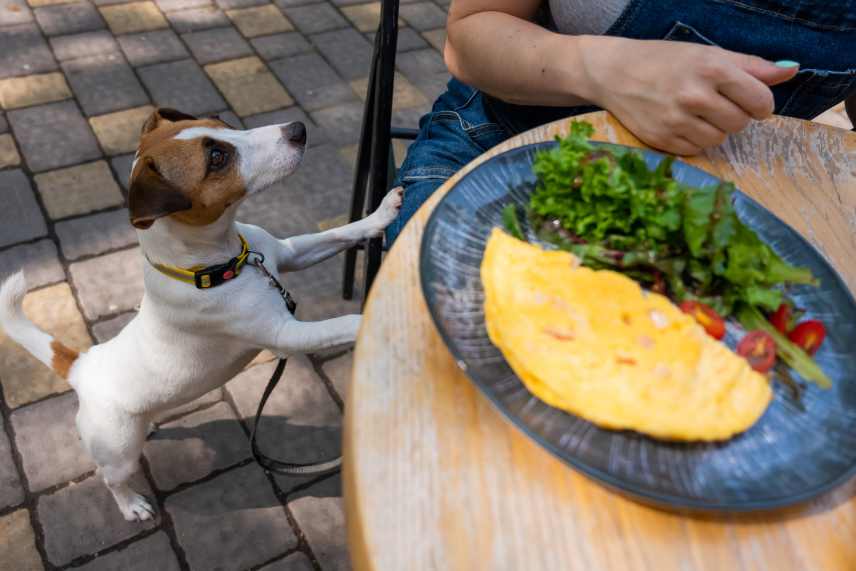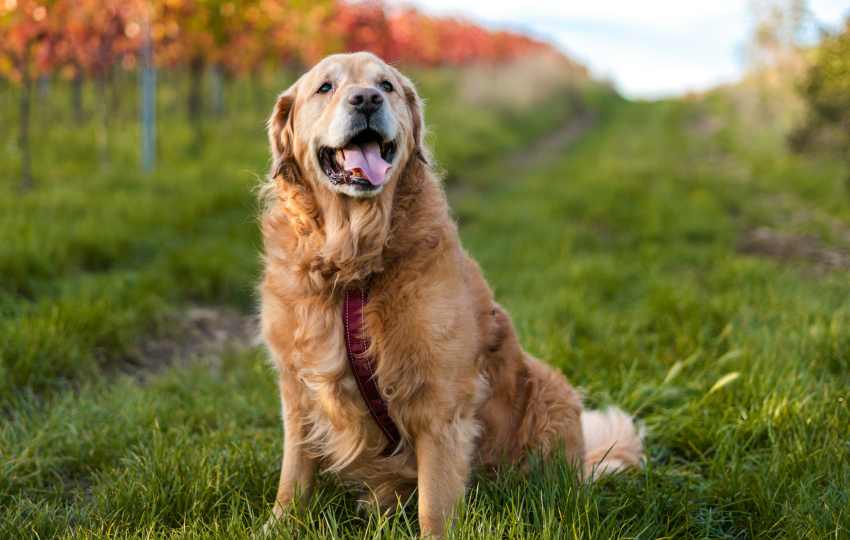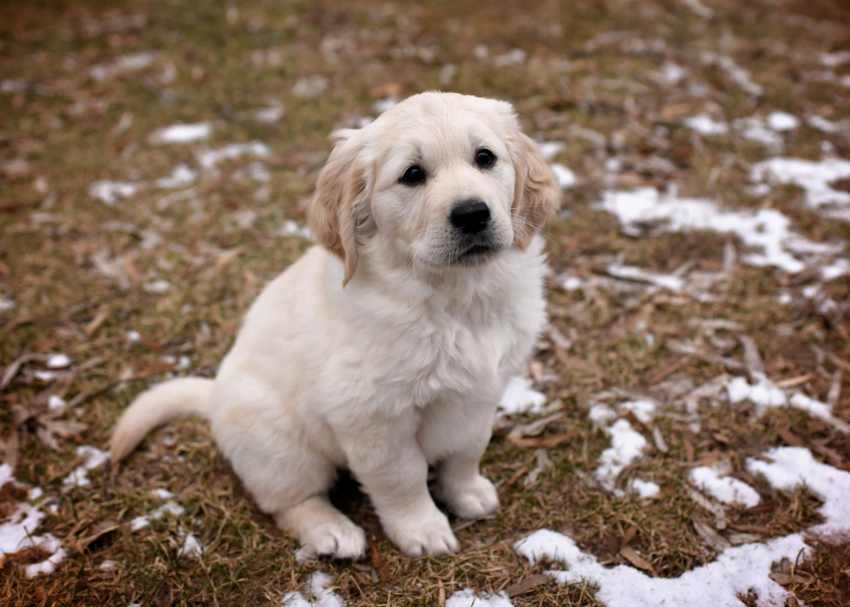Puppies are adorable, and it’s hard to resist their cute little faces when they beg for food. However, this behavior can quickly become a problem if it’s not addressed early on. Not only is it annoying, but it can also lead to health issues for your furry friend. In this article, we will explore some effective strategies of how to stop a puppy from begging for food.
One of the most important things to keep in mind when dealing with a begging puppy is consistency. If you give in and feed your puppy from the table once, they will quickly learn that begging is an effective way to get what they want. It’s essential to establish clear rules and boundaries from the beginning to avoid confusion and frustration for both you and your puppy.

As a responsible dog owner, it’s also important to understand why your puppy is begging for food in the first place. Puppies are naturally curious and love to explore their environment, including new smells and tastes. However, they also have a strong instinct to seek out food whenever possible. By understanding these natural tendencies, you can work to redirect your puppy’s behavior in a positive way.
Understanding Puppy Begging Behavior
The Psychology Behind Begging
Puppy begging behavior is a natural instinct that stems from their ancestors’ survival tactics. In the wild, dogs would beg for food from their pack leader to ensure their survival. This behavior is reinforced by the release of the hormone oxytocin, which is associated with social bonding and reward. When a puppy begs for food and receives it, their brain releases oxytocin, making them feel good and reinforcing the behavior.
Common Triggers for Begging
There are several common triggers that can cause a puppy to beg for food. One of the most common triggers is attention-seeking behavior. Puppies may beg for food to get attention from their owners or to be included in family activities. Another trigger is the smell of food. Puppies have a keen sense of smell, and the aroma of food can be irresistible to them. Additionally, puppies may beg for food if they have been rewarded for the behavior in the past. If a puppy has successfully begged for food before, they are likely to continue the behavior in the future.
To prevent puppy begging behavior, it is important to understand the triggers and address them accordingly. Owners can avoid giving their puppies attention when they beg for food and instead reward them for good behavior. They can also limit their puppy’s exposure to the smell of food by feeding them in a separate room or at a different time than the family’s mealtime. Finally, owners should avoid rewarding their puppy’s begging behavior by not giving in to their puppy’s demands for food.
By understanding the psychology behind puppy begging behavior and addressing common triggers, owners can effectively prevent their puppies from begging for food.
Establishing Effective Mealtime Routines
Feeding your puppy can be a challenging task, especially when they beg for food. However, by establishing effective mealtime routines, you can prevent your puppy from begging and ensure they receive the proper nutrition they need.
Creating a Consistent Feeding Schedule
One of the most important aspects of establishing an effective mealtime routine is creating a consistent feeding schedule. By feeding your puppy at the same time each day, they will come to expect their meals and be less likely to beg for food throughout the day.
It’s important to note that puppies require more frequent meals than adult dogs. Generally, puppies should be fed three to four times per day until they are around six months old. After that, they can be transitioned to two meals a day.
Designating a Specific Eating Area
Another important aspect of establishing an effective mealtime routine is designating a specific eating area for your puppy. This can help create a sense of routine and prevent your puppy from begging for food in other areas of your home.
When choosing an eating area, it’s important to select a location that is quiet and free from distractions. This can help your puppy focus on their meal and prevent them from becoming overly excited or distracted during mealtime.
The Importance of Nutritional Balance
Finally, it’s essential to ensure your puppy is receiving the proper nutrition they need. This means providing them with a balanced diet that includes all of the essential nutrients they need to grow and develop properly.
When selecting a puppy food, it’s important to choose a high-quality brand that is formulated specifically for puppies. Look for a food that includes a balance of protein, fat, and carbohydrates, as well as essential vitamins and minerals.
Related article: Recommended Dog Food for Puppies: A Comprehensive Guide
By establishing a consistent feeding schedule, designating a specific eating area, and providing your puppy with a balanced diet, you can help prevent them from begging for food and ensure they receive the proper nutrition they need to thrive.
Training Techniques to Discourage Begging
Positive Reinforcement Strategies
Positive reinforcement is an effective training technique that can be used to discourage begging in puppies. By rewarding good behavior, you can teach your puppy that begging is not acceptable. You can use treats, praise, or toys to reward your puppy when they are not begging for food.
One effective strategy is to give your puppy a treat or toy to play with while you are eating. This will help to distract them from your food and teach them that they can be rewarded for good behavior.
Teaching ‘Leave It’ and Other Commands
Teaching your puppy basic commands such as ‘leave it‘ can be an effective way to discourage begging. When your puppy starts to beg for food, use the ‘leave it’ command to redirect their attention.
You can also teach your puppy other commands such as ‘sit‘ or ‘stay‘ to help them learn self-control. By teaching your puppy these commands, you can help them understand that they will be rewarded for good behavior and not for begging.
Managing and Redirecting Attention
Another effective training technique is to manage your puppy’s environment and redirect their attention. For example, you can feed your puppy before you sit down to eat, or you can place your puppy in another room while you eat.
You can also redirect your puppy’s attention by giving them a toy or bone to play with while you eat. This will help to distract them from your food and teach them that they can be rewarded for good behavior.
In conclusion, training techniques such as positive reinforcement, teaching commands, and managing your puppy’s environment can be effective ways to discourage begging. By using these techniques consistently, you can teach your puppy that begging is not acceptable and help them develop good habits around food.
Preventing Begging Before It Starts
The Role of Early Puppy Training
Preventing begging behavior in puppies requires early training. Puppies are quick learners, and it is easier to prevent bad habits from forming than to try and correct them later on. Consistency is key when training a puppy to avoid begging for food.
Puppies should be trained to understand that food is only given at specific times and in specific amounts. This helps establish good habits and sets clear boundaries for the puppy to follow. Additionally, teaching puppies to eat in their designated area helps prevent them from begging at the table.
Setting Clear Household Rules
Setting clear household rules is essential to preventing begging behavior in puppies. Everyone in the household should be on the same page when it comes to feeding the puppy. This means establishing specific feeding times and amounts, and sticking to them.
It is also important to teach the puppy that begging behavior will not be tolerated. This can be done by ignoring the puppy when it begs for food and rewarding good behavior instead. Providing the puppy with toys or treats during mealtime can also help redirect its attention away from begging.
In conclusion, preventing begging behavior in puppies requires early training and consistent reinforcement of household rules. With patience and persistence, puppies can be trained to understand that begging for food is not acceptable behavior.
Managing the Environment to Reduce Temptation
Using Crates and Baby Gates
One effective way to manage a puppy’s behavior during mealtime is to use a crate or baby gate. Crates provide a safe and secure space for puppies to stay while their owners eat, eliminating the temptation to beg for food. Baby gates can be used to keep puppies in a separate room or area during mealtime, preventing them from being in close proximity to food.
Related article: 8 Step Guide on How to Crate Train a Dog
Keeping Dogs Occupied During Meals
Providing distractions for puppies during mealtime can also be helpful in reducing their temptation to beg for food. Toys, such as puzzle feeders or chew toys, can keep puppies occupied and mentally stimulated while their owners eat. Additionally, providing a separate meal or treat for the puppy to enjoy during the same mealtime can help redirect their attention away from the owner’s food.
The Effect of Removing Visual Cues
Removing visual cues that may trigger a puppy’s desire to beg for food can also be beneficial. This can include removing food from the table or counter, or even eating in a separate room altogether. By eliminating visual cues, the puppy’s focus can be redirected to other activities or distractions, ultimately reducing their temptation to beg for food.
Overall, managing the environment during mealtime can be an effective way to reduce a puppy’s temptation to beg for food. By using crates or baby gates, providing distractions, and removing visual cues, owners can help their puppies develop better behavior during mealtime.
Coping with Setbacks and Persistence
Understanding Extinction Bursts
When trying to stop a puppy from begging for food, it is common to experience an extinction burst. This is a temporary increase in the unwanted behavior that occurs when the puppy realizes that their usual tactics are no longer working. It can be frustrating for the owner, but it is important to remember that this is a normal part of the training process.
During an extinction burst, the puppy may become more persistent in their begging behavior, whining, and barking. It is crucial to remain consistent in ignoring the behavior and not giving in to the puppy’s demands. If the owner gives in to the puppy during an extinction burst, it will only reinforce the unwanted behavior and make it more difficult to eliminate in the future.
Maintaining Consistency and Patience
Consistency is key when training a puppy to stop begging for food. It is important to establish clear rules and boundaries and to stick to them consistently. If the puppy is allowed to beg for food sometimes but not others, it will only confuse the puppy and make the training process more difficult.
Patience is also important when training a puppy. It takes time and effort to change a behavior, and it is important to remain patient and persistent. Owners should not become discouraged if progress is slow or if setbacks occur. It is important to remain consistent and to continue rewarding the puppy for good behavior.
In summary, training a puppy to stop begging for food requires persistence, consistency, and patience. Owners should be prepared for extinction bursts and remain consistent in ignoring unwanted behavior. By maintaining a consistent approach and rewarding good behavior, owners can successfully eliminate unwanted begging behavior in their puppy.
Advanced Training and When to Seek Professional Help
Mastering Basic Obedience Commands
Mastering basic obedience commands is essential for any dog, including puppies. Basic obedience commands include “sit,” “stay,” “come,” and “down.” Teaching these commands can help a puppy learn self-control and manners, which can ultimately reduce the likelihood of begging for food.
To teach basic obedience commands, it is important to use positive reinforcement techniques, such as treats and praise. Consistency is also key, as puppies need repetition and practice to learn new behaviors. It is recommended to keep training sessions short and frequent, rather than long and infrequent.
Recognizing When to Consult a Dog Trainer
While basic obedience training can be effective, some puppies may require more advanced training or professional help from a dog trainer. Signs that a puppy may need additional training include persistent begging for food, destructive behavior, and aggression towards people or other animals.
Dog trainers can provide specialized training to address specific behavior issues, such as food begging. They can also help owners develop a training plan that is tailored to their individual puppy’s needs and personality.
It is important to choose a reputable dog trainer who uses positive reinforcement techniques and has experience working with puppies. Owners should also be prepared to commit time and effort to their puppy’s training, as consistent practice is key to success.
In summary, mastering basic obedience commands and recognizing when to seek professional help can help stop a puppy from begging for food. By using positive reinforcement techniques and seeking help from a reputable dog trainer when necessary, owners can help their puppies develop good behavior and manners.
Health Considerations and Begging
The Link Between Begging and Obesity
Begging for food is a common behavior in puppies, and it can lead to obesity if not addressed. Obesity is a serious health problem in dogs and can lead to a host of other health problems, such as joint problems, heart disease, and diabetes.
When a puppy begs for food, it is important to resist the temptation to give in and feed them table scraps or other human food. This can lead to overfeeding and an unbalanced diet, which can contribute to obesity.
Adjusting Diet to Avoid Health Problems
To avoid health problems associated with obesity, it is important to adjust your dog’s diet. This can be done by feeding them a high-quality dog food that is specifically formulated for their age, breed, and activity level.
It is also important to monitor your puppy’s food intake and adjust their portions as needed. This can help prevent overfeeding and ensure they are getting the right amount of nutrition.
In addition, it is important to provide your puppy with plenty of exercise and playtime to help them maintain a healthy weight. This can include taking them for walks, playing fetch, or engaging in other activities that promote physical activity.
Overall, by being aware of the link between begging and obesity and taking steps to adjust your puppy’s diet and provide them with plenty of exercise, you can help ensure they stay healthy and happy for years to come.
Social Situations and Your Dog’s Behavior
Handling Begging at Events and Gatherings
When attending social events such as picnics and cookouts, it is common for dogs to beg for food. While it may be tempting to give in to their pleading eyes, it is important to resist the urge as it can lead to behavior problems in the long run.
One effective way to handle begging is to bring your dog’s own food and treats. This will not only keep them satisfied but also help them feel included in the gathering. Additionally, it is important to teach your dog basic obedience commands such as “sit” and “stay” to help them understand what is expected of them in social situations.
If your dog continues to beg despite your efforts, it may be necessary to remove them from the social situation temporarily. This will help them understand that begging is not acceptable behavior and will also prevent them from becoming a nuisance to other guests.
Educating Visitors and Managing Expectations
It is important to educate visitors about your dog’s behavior and the rules you have set in place to prevent begging. This will help manage their expectations and prevent any misunderstandings.
One effective way to do this is to provide a list of rules and expectations for your dog before the event. This can include information on what food your dog is allowed to eat, where they are allowed to sit, and what commands they know.
Additionally, it is important to be consistent with your rules and expectations. If visitors see that you are allowing your dog to beg or break the rules, they may be more likely to do the same.
By following these tips, you can help prevent begging behavior in your dog and ensure a pleasant social experience for both you and your guests.
Conclusion: How to Stop a Puppy from Begging for Food
Puppies’ begging for food, while initially adorable, can become problematic if not addressed early. It’s crucial to maintain consistency in not giving in to begging to prevent reinforcing the behavior.
Establishing clear rules from the start helps avoid confusion and frustration. Understanding that puppies’ begging stems from natural curiosity and a strong instinct to seek food can guide owners to redirect this behavior positively.
The Ultimate Guide to Teaching Your Dog the Stay Command

Teaching your dog the stay command is a valuable skill that enhances obedience and safety in various situations. Whether at home, in the park, or crossing the street, a reliable “stay” command ensures your dog remains in place until released.
In this comprehensive guide, we’ll provide detailed instructions and expert tips to help you effectively teach your dog the stay command using positive reinforcement techniques.
Continue reading: The Ultimate Guide to Teaching Your Dog the Stay Command
Guide to Teaching Your Dog the Sit Command

In this comprehensive guide, we’ll walk you through a detailed, step-by-step process to teach your dog to sit effectively using positive reinforcement techniques.
Continue reading: Teaching Your Dog the Sit Command Step-by-step
Online Dog Training Courses: Master the Art of Dog Training from the Comfort of Your Home

The convenience of online courses means you can learn at your own pace and fit training sessions into your schedule, no matter how busy you are. Plus, with interactive videos, demonstrations, and instructional materials, you’ll have all the tools you need to succeed.
Continue reading: Online Dog Training Courses

